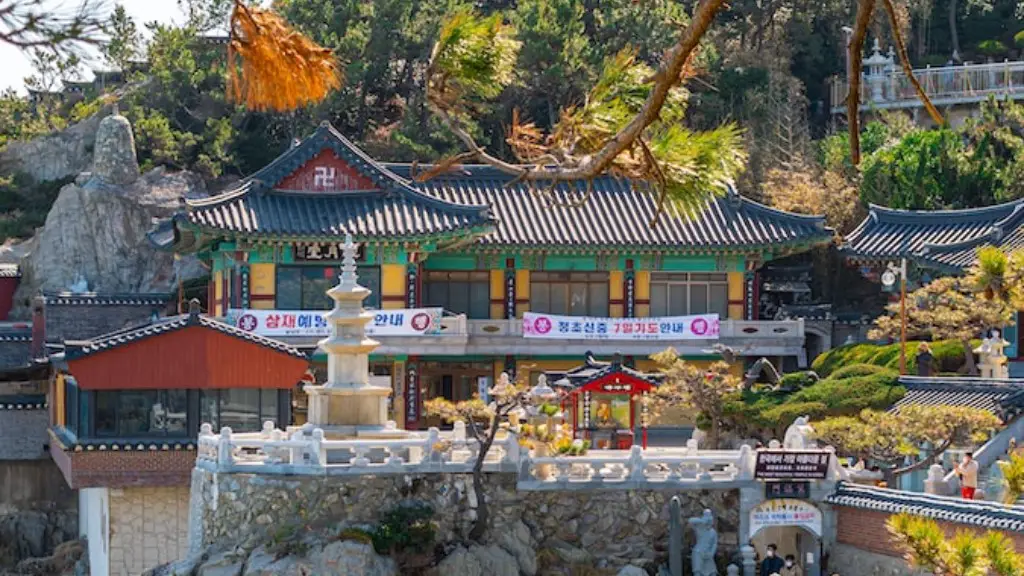North Korea has long been isolated from the rest of the world due to the oppressive regime of its leaders. The government maintains strict control over information, communication and resource access, making it difficult for outsiders to enter North Korea and even harder to leave. North Korea has been ostracized by the international community, and its isolation has only deepened since its leader Kim Jong-un came to power in 2011. This article looks at what has caused North Korea’s isolation, its impact and why it remains such a dark and mysterious country.
Background
North Korea’s plunge into intense isolation began in the late 1940s and early 1950s, when the Communist government of Kim Il Sung came to power. Following the Korean War, North Korea became isolated from the West, with the only land border that it shared with its southern neighbor, South Korea, guarded by the United States Army.
Since then, Kim Il Sung and his son and successor Kim Jong-il have used fear and extreme control over the media, travel and communication in order to isolate North Korea from the rest of the world. The country has been increasingly closed off from the rest of the world, with virtually no Internet access and few outside cultural influences.
In 2011, North Korea’s isolation was exacerbated when Kim Jong-un became the leader of the country following his father’s death. Since his accession to power, he has tightened restrictions on access to the regime and increased purges to eliminate potential rivals. North Korea is now the most isolated country in the world and one of the few remaining communist states.
Economic Isolation
North Korea’s isolation is largely economic. Once a part of the Soviet-controlled Eastern Bloc, the regime has been unable to open up its economy and trade with the outside world. This lack of access to capital and resources has hindered the growth of the country, which remains one of the poorest in the world.
The UN Security Council has imposed severe economic sanctions on North Korea in response to its nuclear program. These sanctions have further hampered the Pyongyang government’s already anemic economy and led to decreased access to food and medical supplies. North Korea is also facing increased diplomatic pressure as other nations have started to recognize the human rights abuses that are occurring in the country.
The regime is further isolated due to its strained relationship with China, its only ally. China has become increasingly vocal about its disapproval for North Korea’s nuclear arms and missile development, and has started to slow down economic cooperation with the country. This has made it harder for North Korea to access capital, resources, and technology from the outside world.
Diplomatic Isolation
North Korea has also become diplomatically isolated over the years. The country has few diplomatic relationships, and there are no embassies or consulates in any country that has diplomatic relations with North Korea. This severely limits North Korea’s opportunities to engage in dialogue with other governments and to participate in regional and international organizations.
In addition, North Korea’s government is widely criticized for its human rights abuses and lack of transparency. This has led to further isolation as the international community has increasingly come to view North Korea as a dangerous and unpredictable nation. This isolation has made it increasingly difficult for North Korea to develop diplomatic relationships, or to receive foreign aid from other countries.
The Impact of Isolation
North Korea’s isolation has had a severe impact on the country, its people and its economy. The limited access to the outside world has hindered the free exchange of information, resources, and technology. This lack of access has made it difficult for North Korea to develop and modernize its economy, leaving the country in dire economic straits.
The lack of communication also limits the ability of North Koreans to form meaningful connections with people outside their borders. This has left North Koreans feeling lonely and isolated and unable to share experiences and ideas. North Koreans also face immediate hardship due to the economic sanctions and reduced access to food and medical supplies.
Why It Continues
North Korea’s isolation continues in large part due to its leader’s preoccupation with maintaining his power. To do so, Kim Jong-un must control all aspects of communication, travel and information. This necessitates North Korea’s isolation to be artificially maintained. Despite UN sanctions and international pressure, North Korea’s government has shown little interest in opening up its borders or its economy.
Kim has made it clear that any openness or cooperation with the outside world is contingent on having certain foreign policy objectives met. This has put North Korea in an untenable situation where it must maintain its isolation or risk having its regime destabilized by outside forces.
International Action
The international community has taken action to try and encourage North Korea’s government to open up and allow access to its citizens. In 2018, the UN Security Council passed a measure to raise economic sanctions on North Korea in an attempt to pressure the state to open up its borders. Similarly, the United States and South Korea have engaged in talks with North Korea in an attempt to reduce tensions on the peninsula and open up communication between the two nations.
Recently, a series of three summits between North Korean leader Kim Jong-un and South Korean President Moon Jae-in took place, culminating in an agreement to begin talks aimed at formally ending the Korean War. It remains to be seen if the summits will have any lasting effect on the situation, however, the meetings have provided some hope that North Korea may be receptive to working towards greater openness.
Analysis
North Korea’s isolation is a complex issue, with both internal and external factors at work. It is clear that the Korean War and the oppressive regimes of Kim Il Sung and Kim Jong-Il have had a major effect on North Korea’s isolation. Further complicating matters is North Korea’s nuclear arms and missile development and strained relationship with China.
The international community has taken steps to attempt to open up North Korea and to encourage the regime to work towards greater openness. However, it is unclear if these efforts will be successful, as the country’s leaders have made it clear that any cooperation must meet their foreign policy objectives. Therefore, despite the recent summits between North and South Korea, North Korea remains an enigma, its long-term fate still uncertain.
Humanitarian Situation
The situation inside North Korea is bleak, as the population continues to suffer from the effects of the country’s isolation and harsh regime. About one-third of North Koreans are undernourished and lack access to adequate healthcare, with many living in extreme poverty. Other reports suggest that the prison and labor camps are full of political prisoners and dissidents, and that the country is rife with human rights abuses.
Recent reports suggest that North Korea’s leaders are more open to the international community and are willing to engage in dialogue. If this is the case, it could open up the possibility for more humanitarian aid to flow into the country. This could provide much-needed relief to North Koreans and potentially even lead to more improved human rights.
Cultural Barriers
North Korea’s isolation also means that there is a lack of communication and exposure between North Koreans and the outside world, leading to a cultural divide. North Koreans have little access to outside sources of information or entertainment, making it difficult for them to gain a global perspective. In addition, there is a language barrier, as North Korea and the outside world do not share a common language.
The lack of communication has also led to misunderstandings and mistrust between North Koreans and people from other countries. This can exacerbate tensions, as neither side is able to fully understand and appreciate the other’s perspectives. Efforts to bridge the cultural divide must involve respect on both sides and an effort to understand the other’s culture and history.
North Korea’s isolation has caused immense suffering and hardship for North Koreans, and the risk of further conflict between North Korea and the outside world remains high. The international community must work together to find a way to ease the tensions and facilitate dialogue with the North Korean government. With a little luck and the right incentives, it may be possible to bring North Korea out of its isolation.




